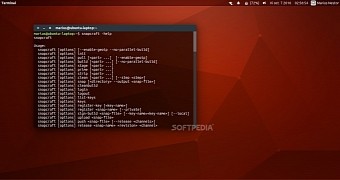Canonical released over the weekend version 2.42 of its Snapcraft command-line tool for creating Snap packages on the Ubuntu Linux operating system.
Snapcraft 2.42 comes less than two weeks after version 2.41, which improved the mechanism for overriding lifecycle steps, passthrough property, error reporting, and updated the dotnet, nodejs, and python plugins, to add even more enhancements to the utility that helps application developers to package their apps as Snaps.
In Snapcraft 2.42, there's a new feature called multipass cleanbuild support, which might come in handy to users of snapcraft cleanbuild with multipass installed. To try it out, you'll have to run the "$ SNAPCRAFT_BUILD_ENVIRONMENT=multipass snapcraft cleanbuild" command in the terminal emulator.
On the other hand, Snapcraft 2.42 removes support for remote persistent containers, which was in the experimental phase for some time now and never got to be ready for production use. It was available only as a feature flag that allowed users to enable a remote LXD instance to handle the build with local mounts.
"Given this was a feature flag and never left its experimental stages, removing it was the right thing to do to remove any expectation that this will be driven further or have user go through a bad experience when using it," said Snapcraft developer Sergio Schvezov. "This does not affect using local persistent LXD containers, nor does it affect remote cleanbuilds."
Reworked "architectures" keyword, dotnet plugin improvements
Among other changes included in Snapcraft 2.42, we can mention the ability of the dotnet plugin to override the plugin logic when the "override-build" option is used, restructuring of the "architectures" keyword into a list of more explicit objects where both build and run architectures are specified.
There are several other smaller improvements and bug fixes included in Snapcraft 2.42, all of which you can see attached below or in the release notes on GitHub, from where you can download the source tarball if you want to compile it on your Ubuntu operating system. However, this release should soon be available in the repositories of all supported Ubuntu releases.

 14 DAY TRIAL //
14 DAY TRIAL //